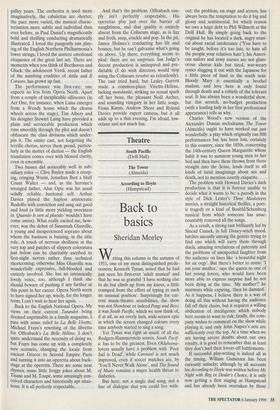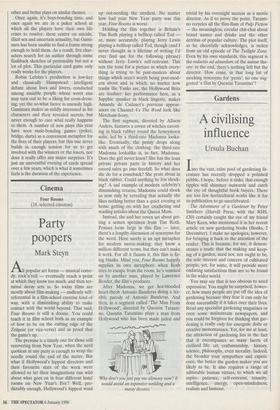Theatre
South Pacific (Drill Hall) The Tower (Almeida) According to Hoyle (Hampstead)
Back to basics
Sheridan Morley
Writing this column in the autumn of 1951, one of my most distinguished prede- cessors, Kenneth Tynan, noted that he had just seen his first-ever 'adult musical' and that he was so grateful 'I have nothing else to do but climb up from my knees, a little cramped from the effort of typing in such an unusual position'. Surprisingly for cur- rent music-theatre sensibilities, the show was not Showboat or indeed Porgy and Bess; it was South Pacific, which we now think of, if at all, as an overly lush, wide-screen epic in which the screen changed colours every time anybody started to sing a song.
Yet Tynan was right as usual: of all the Rodgers-Hammerstein scores, South Pacif- ic has to be the greatest. Even Oklahoma- lovers usually have a problem with 'Poor Jud is Dead', while Carousel is not much improved, even if soccer matches are, by `You'll Never Walk Alone', and The Sound of Music remains a major health threat to diabetics.
But here, not a single dud song, not a line of dialogue that you could live with- out; the problem, on stage and screen, has always been the temptation to do it big and glossy and sentimental, for which reason we owe a huge debt to Phil Willmott at the Drill Hall. By simply going back to the original he has located a dark, angry musi- cal about racial intolerance (`You have to be taught, before it's too late, to hate all the people your relatives hate'); his Ameri- can sailors and army nurses are not glam- orous chorus kids but tired, war-weary cynics slugging it out with the Japanese for a little piece of land in the south seas: Bloody Mary is essentially a brothel madam, and love here is only found through death and a rebirth of the tolerant soul. It has always been a wonderful show, but this scratch, no-budget production (with a leading lady in her first professional appearance) tells us why.
Charles Wood's new version of the Alexandre Dumas melodrama The Tower (Almeida) ought to have worked out just wonderfully: a play which originally ran 800 performances but has been lost, certainly to this country, since the 1850s, concerning the 14th-century Queen Marguerite whose habit it was to summon young men to her bed and then have them thrown from there straight into the Seine, lends itself to all kinds of lurid imaginings about sex and death, not to mention courtly etiquette.
The problem with Howard Davies's dark production is that it is forever unable to decide what it wants to be: a parody in the style of Dick Lester's Three Musketeers movies, a straight historical thriller, a poet- ic tragedy or a kind of Boublil/Schonberg musical from which someone has unac- countably removed all the songs.
As a result, a strong cast brilliantly led by Sinead Cusack, in full Disney-witch mood, lurches uneasily among the genres trying to find one which will carry them through duels, amazing revelations of paternity and the problems of unexpected laughter from the audience on lines like 'a beautiful night for an orgy'. But there's better to come: 'I am your mother,' says the queen to one of her young lovers, who would have been more able to express surprise had he not been dying at the time. 'My mother?' he murmurs while expiring, 'then be damned.' As it happens, I believe there is a way of doing all this without having the audience fall off their chairs, but it requires a willing abdication of intelligence which nobody here seems to want to risk; fatally, the com- pany wishes to comment on the show while playing it, and only John Napier's sets are sufficiently over the top. At a time when we are having severe doubts about our own royalty, it is good to remember that at least they don't hurl their lovers off battlements.
If successful play-writing is indeed all in the timing, William Gaminara has been curiously unlucky; although by all accounts his According to Hoyle was written before My Night with Reg or Dealer's Choice, it is only now getting a first staging at Hampstead and has already been overtaken by those other and better plays on similar themes.
Once again, it's boys-bonding time, and once again we are in a poker school at which all the players have their own life crises to resolve: these centre on suicide, illicit sex and uncertain sexuality, but Gami- nara has been unable to find a frame strong enough to hold them. As a result, five char- acters search for an author through some flashback sketches of personality but not a lot of plot. This particular card game only really works for the players.
Robin Lefebre's production is low-key and classically Hampstead: intelligent debate about lives and lovers, conducted among amiable people whose worst sins may turn out to be a liking for cross-dress- ing; yet the so-what factor is uneasily high. Gaminara makes us mildly interested in his characters and their revealed secrets, but never enough to care what really happens to them. A number of new plays this year have seen male-bonding games (poker, bridge, darts) as a convenient metaphor for the lives of their players, but this one never builds in enough tension for us to get involved with the winners or the losers, nor does it really offer any major surprises. It's just an uneventful evening of cards spread over a few years, which is what it sometimes feels is the duration of the experience.



















































 Previous page
Previous page